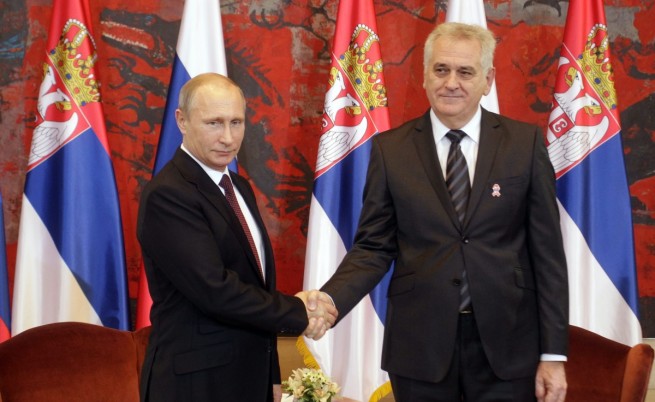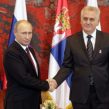
Russia’s Newest Balkan Games
Publication: Eurasia Daily Monitor Volume: 13 Issue: 47
By:

Experts have long known that the Balkans are a political battleground between Russia and the West. And this chronic non-military conflict has only intensified with Russia’s invasion of Ukraine and intervention in Syria. Clearly, Moscow regards both democracy and European integration—the two key issues in the Balkans—as dangerous to Russian interests. The recent announcement of impending elections in Serbia and Macedonia will almost certainly lead to an intensification of Russian as well as Western efforts to influence the outcome. Serbia is arguably the easiest place for Russia to block Westernization of the Balkans, and Macedonia is now a prime regional battleground in the heated debates over issues of refugees and energy.
The first signs of this increased Russian pressure are already visible. For example, in mid-February, Moscow denounced the newest logistics support agreement reached between the North Atlantic Treaty Organization (NATO) and Serbia as an attempt to draw Belgrade into the Alliance’s orbit; Russia has insisted that Serbia hew to its stated neutrality (TASS, February 18). Although it does not seek NATO membership, the Serbian government has nevertheless been committed, since 2014, to join the European Union. But Serbian authorities clearly face many domestic obstacles to this goal. Consequently, Belgrade’s policies have to constantly balance between Brussels and Moscow. Thus, Serbia has eschewed EU’s sanctions on Russia and has had to, once again, openly declare its commitment to neutrality to pacify Moscow (Corriere della Sera, December 10, 2014; Politika, February 29).
Even so, in Serbia, Russia possesses many instruments of leverage that it is now deploying to block Belgrade’s drift toward Europe. And these instruments go beyond just the popular mythology of fraternal or religious brotherhood. For instance, Russia, through Gazprom, owns 51 percent of Serbian oil reserves, which makes it impossible to know for sure how much oil Serbia actually possesses (B92, January 6, 2015). Serbia’s armed forces are also looking to buy Russian air defenses and advanced MiG-29 warplanes. Moreover, the two states will hold joint military exercises during the first quarter of 2016 (TASS, February 2; B92, February 4).
In the domestic political sphere, the opposition, extra-parliamentary Serbian People’s Party (SPP), which was formed in 2014, is clearly pro-Russian and opposes Serbia’s entry into the EU (Vecernij Novosti, December 31, 2014; Srpskanarodnapartija.rs, accessed March 9). Earlier this month, the SPP declared it would join the ruling Serb Progressive Party’s electoral list in the upcoming parliamentary elections, scheduled for April 24. In its announcement, the SPP called for Serbia to develop closer institutional ties with Russia on the model of Belgrade’s cooperation with the EU (B92, March 2).
On his visit to Moscow, this week (March 8–10) President Tomislav Nikolić called for further increasing Russo-Serbian trade, which is largely connected to energy, and also cited the religious ties linking the two countries. He also hyperbolically claimed that, if not for Russia, the Islamic State would already be in control of Serbia (TASS, March 8).
The German government and Serbian non-governmental organizations like the Center for Euro-Atlantic Studies point to a “synergy” of Russian and Serbian anti-European interests, who wish to preserve their sources of corrupt income free from EU scrutiny and outside of any democratic accountability (Politika, February 29; Spiegel, November 17, 2014). Moreover, they discern evidence of mounting Russian pressure on Serbian media outlets. Notably, reports have highlighted Russian interests in Serbian TV and other media outlets being bankrolled by Kremlin-connected oligarch Konstantin Malofeev, whom the United Nations has accused of helping to finance Russia’s invasion of Ukraine (Slobodnaevropa.org, February 14). Malofeev was already named by the Belgrade edition of Pravda, in 2014, as an agent of the Russian government (Pravda—Belgrade, December 3, 2014).
In Macedonia, there are also grounds for concern regarding the country’s upcoming snap parliamentary elections. Originally scheduled for April 24, these elections are part of an EU-brokered deal to end street protests against the government of Nikola Gruevski. But the Macedonian opposition Socialist Party, led by Zoran Zaev, demanded a postponement (until June 5), accusing the current caretaker government of failing to ensure a democratic contest, despite Washington and Brussels’ support for the elections. This delay leaves Macedonia without a functioning administration in the midst of a difficult political situation and human calamity caused by thousands of refugees and migrants who remain bottled up in Serbia and Macedonia because Austria, Hungary and other Western countries continue to block their entry. In connection to this issue, German intelligence has reported a surreptitious Russo-Greek plan to mass 100,000 refugees on Greece’s border with Macedonia to destabilize the latter (a Greek aim) and the Balkans as a whole (a Russian aim). German intelligence has specifically singled out Malofeev for his role in this and other plots involving pro-Russian Greeks (Balkananalysis.com, March 8)
Macedonia has long been a battleground for competing Russian and Western influence. In 2015, Russian Foreign Minister Sergei Lavrov even floated rumors that Bulgaria and Albania might try to partition Macedonia—a transparent ploy to destabilize the pro-Western government in Skopje (Novinite.com, May 20, 2015). Postponement of Macedonia’s elections will, therefore, only benefit Moscow. Indeed, General Phillip Breedlove, the Supreme Allied Commander in Europe (SACEUR) has indicated that Russia actively seeks to aggravate the European refugee crisis by its ongoing bombing in Syria (Deutsche Welle, February 22; Russia-insider.com, February 22). As a frontline state meeting this human wave, Macedonia cannot afford months of political uncertainty and incapacity in the face of this difficult predicament.
The wide spectrum of instruments of Russian pressure on the Balkans is readily visible: in energy, arms sales, bilateral military-military connections, religious affiliation, business links, and the acquisition of media ties with which to influence domestic political parties, some of which are already receiving money or other types of assistance from Moscow. Russia’s support for Serbia’s position on Kosovo and the opening of an RT office in Belgrade, in 2015, exemplify these efforts to leverage influence on Serbian nationalist parties and the population (Balkaninsight.com, October 27, 2014; Newsweek, January 6, 2015). Much of the evidence concerning the linked nature of these manifestations of political warfare clearly lie below the surface, but there is enough out in the open to show that Moscow will continue to contest the Balkans and seek every means possible to destabilize this vulnerable region and, thereby, Europe. Therefore, when discussing Russia’s efforts to undermine Europe, one cannot omit the Balkans, which remain a key to Moscow’s overall foreign policy strategy.




